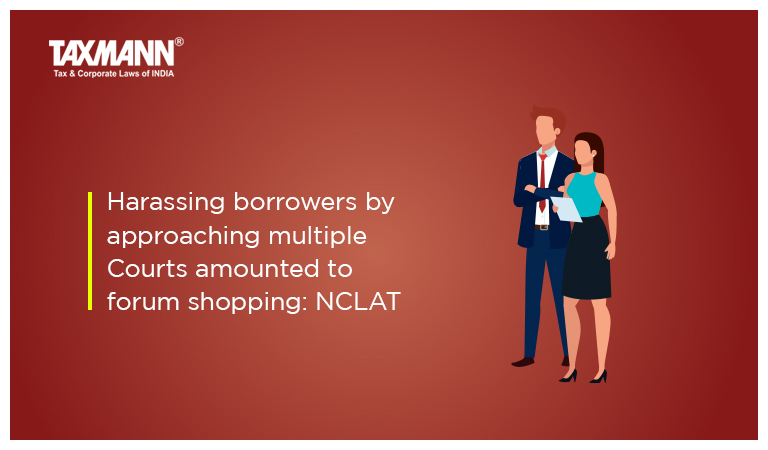Harassing borrowers by approaching multiple Courts amounted to forum shopping: NCLAT
- Blog|News|Insolvency and Bankruptcy Code|
- 2 Min Read
- By Taxmann
- |
- Last Updated on 26 September, 2022

Case Details: Partha Paul v. Kotak Mahindra Bank Ltd. - [2022] 142 taxmann.com 237 (NCLAT-New Delhi)
Judiciary and Counsel Details
-
- M. Venugopal, Judicial Member & Dr Ashok Kumar Mishra, Technical Member
- Amit Mahaliyan, Adv. & Jitendra Lohia, RP for the Respondent.
Facts of the Case
In the instant case, the respondent – a banking company sanctioned a loan to M/s. Camellia Educate Services Ltd (CES), M/s. Multiple Educational and manpower Development Trust (MEMDT) and Camellia Educate Trust (CET) respectively in the year 2012.
In lieu of the said loans, the appellant-corporate debtor executed a corporate guarantee agreement. Subsequently, the respondent bank issued a demand notice under section 13(2) of the SARFAESI Act, 2002 to the appellant demanding a due amount of loan.
Thereafter, the respondent filed an application u/s 7 of the IBC against the appellant and the same was admitted by the Adjudicating Authority (NCLT). Thereafter, an appeal was made to the National Company Law Appellate Tribunal (NCLAT) against the order passed by the NCLT.
The appellant contended that borrowers were continuously making payments in spite of receiving demand notice and offered a one-time settlement (OTS) offer to the respondent with a demand draft as an ad hoc upfront amount, however the same was refused by the respondent bank without any reason. Further, the appellant contended that the respondent bank had initiated multiple proceedings in different avenues of law
NCLAT Held
The NCLAT observed that the impugned order of the NCLT was passed ex parte and further the respondent bank was involved in multiple Courts/Tribunal just to harass the guarantor and it also moved to the High Court to coerce trust into paying off its debts and involved the appellant in time-consuming and expensive litigation.
The NCLAT held that the instant case fell under the category of forum shopping as it was a classic example of Forum Shopping when the respondent Bank had approached one court for relief but does not get the desired relief and then approached another court for the same or similar relief.
Therefore, the ex parte order passed by the Adjudicating Authority was to be set aside and the matter was to be remanded back to the Adjudicating Authority to decide the matter afresh. Accordingly, the appeal was allowed.
List of Cases Reviewed
-
- Order passed by NCLT (Kolkata) in Kotak Mahindra Bank Ltd. v. Multiple Hotels (P.) Ltd. [CP(IB) No. 204/KB/2019, dated 4-10-2019] (para 14) reversed.
List of Cases Referred to
-
- Union of India v. Cipla Ltd. [2017] 5 SCC 262 (para 14)
- Vijay Kumar Ghai v. State of West Bengal [Criminal Appeal No. 463 of 2022, dated 22-3-2022] (para 14)
- Transmission Corporation of Andhra Pradesh Ltd. v. Equipment Conductors and Cables Ltd. [2018] 98 taxmann.com 375/150 SCL 447 (SC) (para 14)
- Swadeshi Cotton Mills v. Union of India [1981] 1 SCC 664 (para 14)
- Shree Krishna Educational Trust v. Government of TN 2016 SCC Online Mad. 20115 (para 14)
- Maneka Gandhi v. Union of India [1978] 1 SCC 248 (para 14).
Disclaimer: The content/information published on the website is only for general information of the user and shall not be construed as legal advice. While the Taxmann has exercised reasonable efforts to ensure the veracity of information/content published, Taxmann shall be under no liability in any manner whatsoever for incorrect information, if any.

Taxmann Publications has a dedicated in-house Research & Editorial Team. This team consists of a team of Chartered Accountants, Company Secretaries, and Lawyers. This team works under the guidance and supervision of editor-in-chief Mr Rakesh Bhargava.
The Research and Editorial Team is responsible for developing reliable and accurate content for the readers. The team follows the six-sigma approach to achieve the benchmark of zero error in its publications and research platforms. The team ensures that the following publication guidelines are thoroughly followed while developing the content:
- The statutory material is obtained only from the authorized and reliable sources
- All the latest developments in the judicial and legislative fields are covered
- Prepare the analytical write-ups on current, controversial, and important issues to help the readers to understand the concept and its implications
- Every content published by Taxmann is complete, accurate and lucid
- All evidence-based statements are supported with proper reference to Section, Circular No., Notification No. or citations
- The golden rules of grammar, style and consistency are thoroughly followed
- Font and size that’s easy to read and remain consistent across all imprint and digital publications are applied



 CA | CS | CMA
CA | CS | CMA
